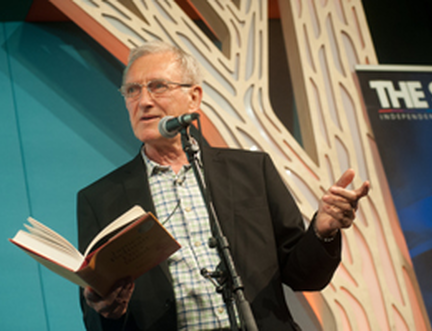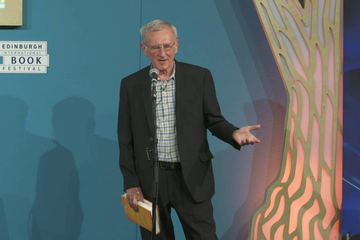More articles Sunday 21 August 2016 6:15pm
James Kelman Discusses His New Novel

“My intentions,” began James Kelman in typically precise and forthright style, “are to read”. And so the giant of Scottish literature, whose latest novel Dirt Road has been hailed as a masterpiece and his most humane book in years, read for a generous half hour.
Slowly, lyrically and with the occasional chuckle (and southern American accent), he read from the atmospheric opening section of Dirt Road in which Murdo, the passionate 16-year-old son of staid Scotsman Tom, goes to a store to buy teabags in a small Mississippi town where father and son are on holiday. (Actually, they’re supposed to be in Alabama but they got the wrong bus.) Murdo stumbles on an impromptu Cajun blues session, ends up playing accordion with them, and experiences a quiet, awkward and only partially understood moment of joy and belonging. It was a touching and deceptively simple scene that laid out the complex concerns of Dirt Road: family, race, immigration, the inarticulacy of loss, music and, as ever with Kelman, Scottishness.
Kelman, however, described Dirt Road as “a portrait of the artist novel”. He spoke about Murdo’s talent for music and its power to connect him not just to Scotland but to his family and own inner life. Speaking of his characters as though they were old friends, Kelman explained that Murdo and his father were grieving for his mother, who died a few months earlier, and his sister who died five years previously. “They haven’t got over it,” he explained matter-of-factly. “Who could get over it?”
On mellow, almost roguish form, Kelman talked about a formative trip to the States with his family in 1963 that inspired Dirt Road. “We emigrated to America for a few months,” he said. “Being 17 in America was difficult for me. I had left school and was doing an apprenticeship but it was not possible to work or go to school there. I ended up walking the streets of Los Angeles for three months looking for a job.”
He confessed to not knowing the southern states of Alabama and Mississippi personally and wrote from his memory of a road trip along Route 66, “working with a map all the time”. Dirt Road is Kelman’s second novel set in the US but his first to explicitly deal with wider themes of “older kinds of immigration” and how political consciousness and identity are formed in the individual. As always, Kelman added, he wrote a lot “and then took stuff out”. And his endings “always take me by surprise”, he added. “I put it away then come back and think ‘I can’t believe that!’”
Finally, Kelman discussed music and its relationship with immigration: the Appalachian songs and bluegrass of Alabama and how Scottish settlers influenced Americana and blues from the 17th century onwards. Jazz fanatics were particularly Scottish because “they have a Calvinist approach to music”. He disclosed a link to Dizzy Gillespie: “Both our grandfathers spoke Gaelic,” he said ruefully, “but neither of us do” and spoke about his love of Doc Watson, the legendary country guitarist. Recalling a game of pontoon in Sixties London when his fellow player was unable to cough up the £5 he owed him and gave him a Doc Watson album instead, he laughed, “it’s probably worth about £100 now… but then so is the fiver.”
Look, Listen & Read
- 2026 Festival:
- 15-30 August
Latest News
 Major new partnership with Celtic Connections
Major new partnership with Celtic Connections





